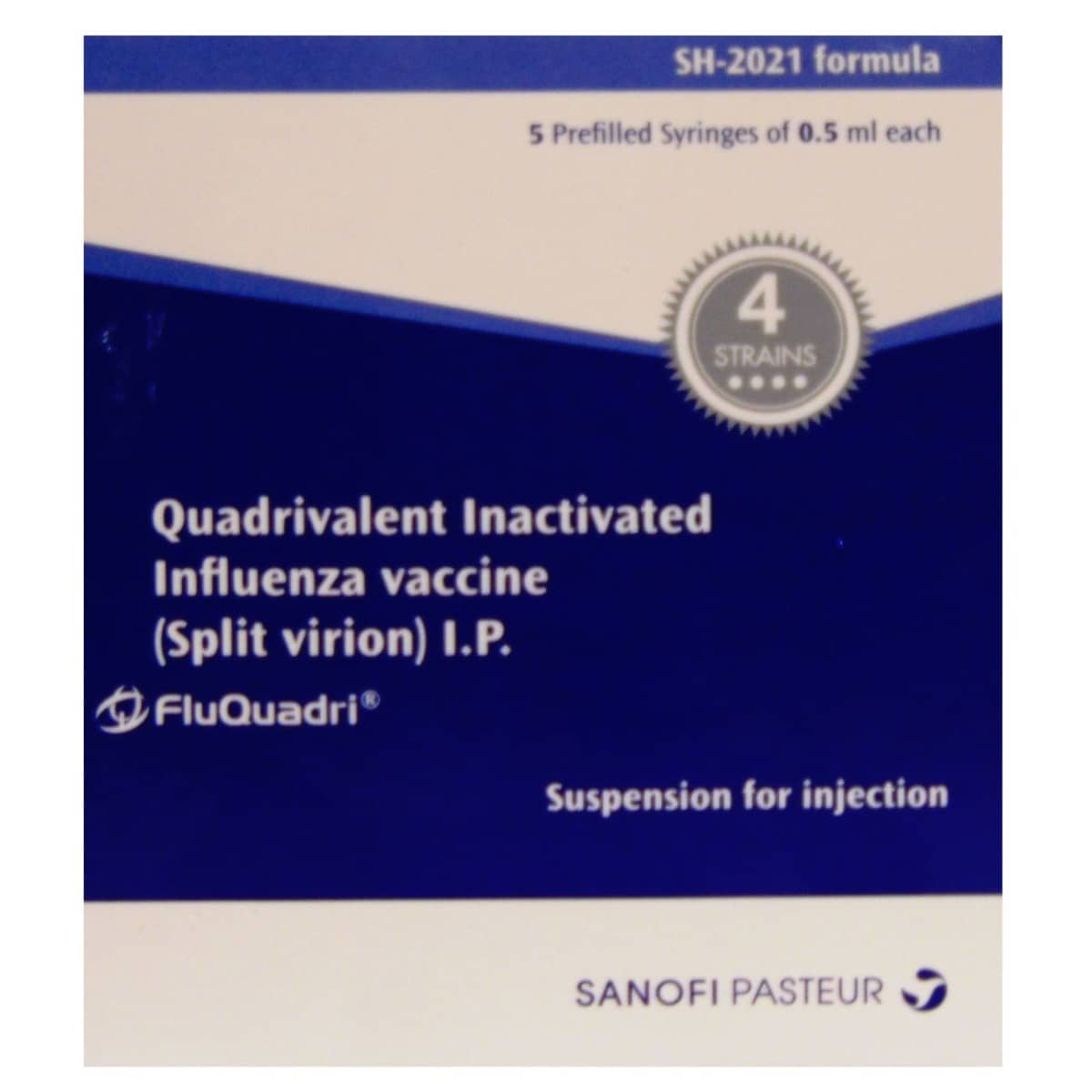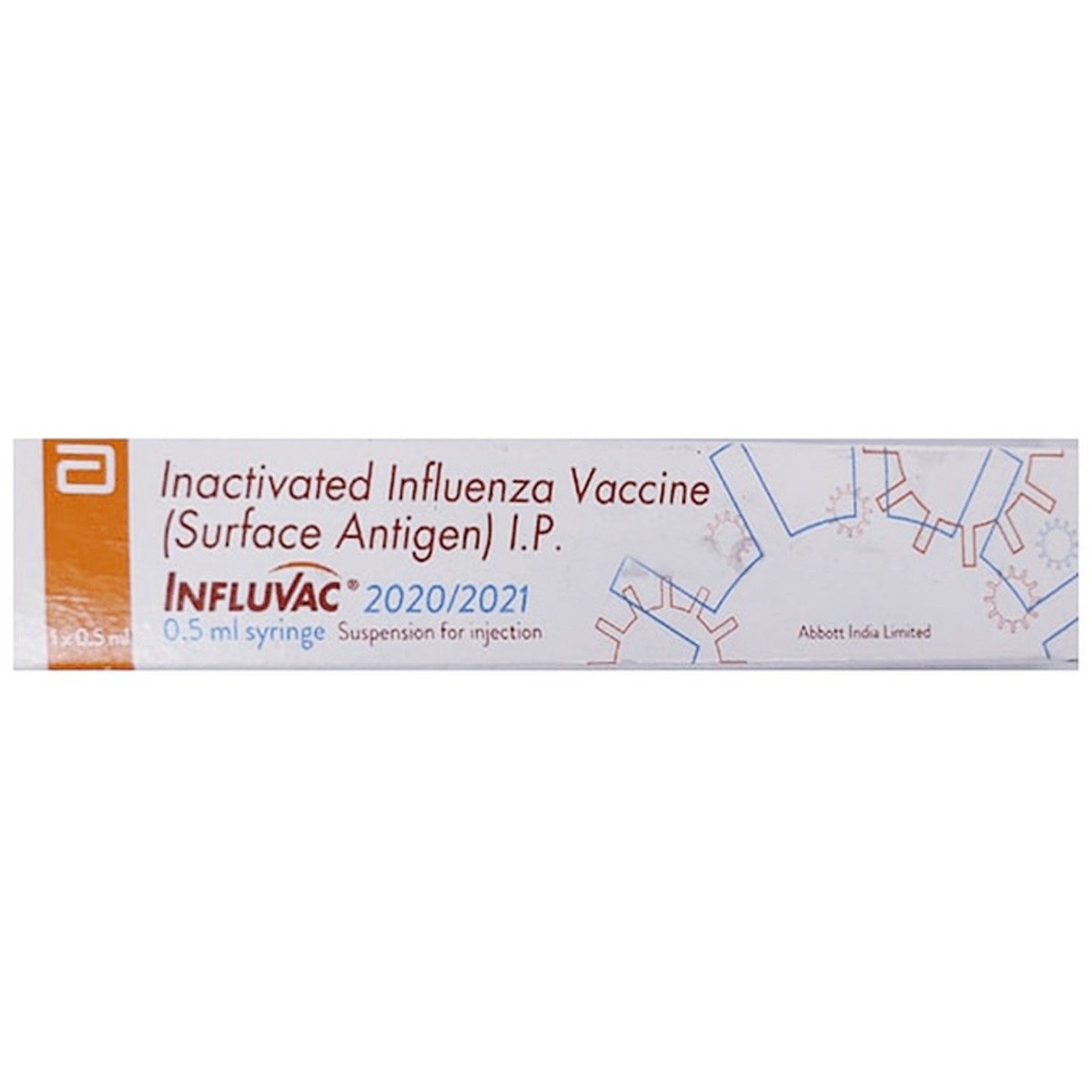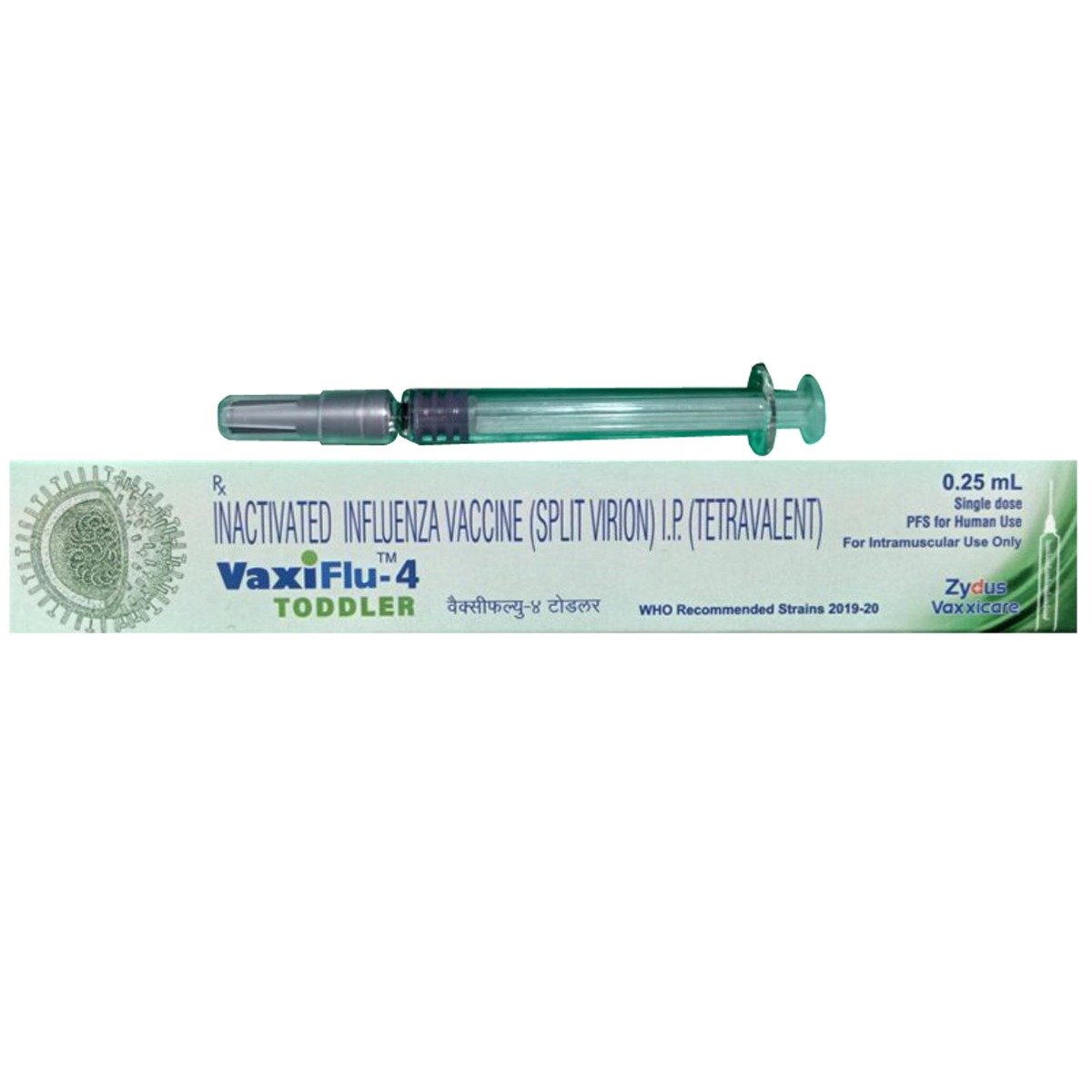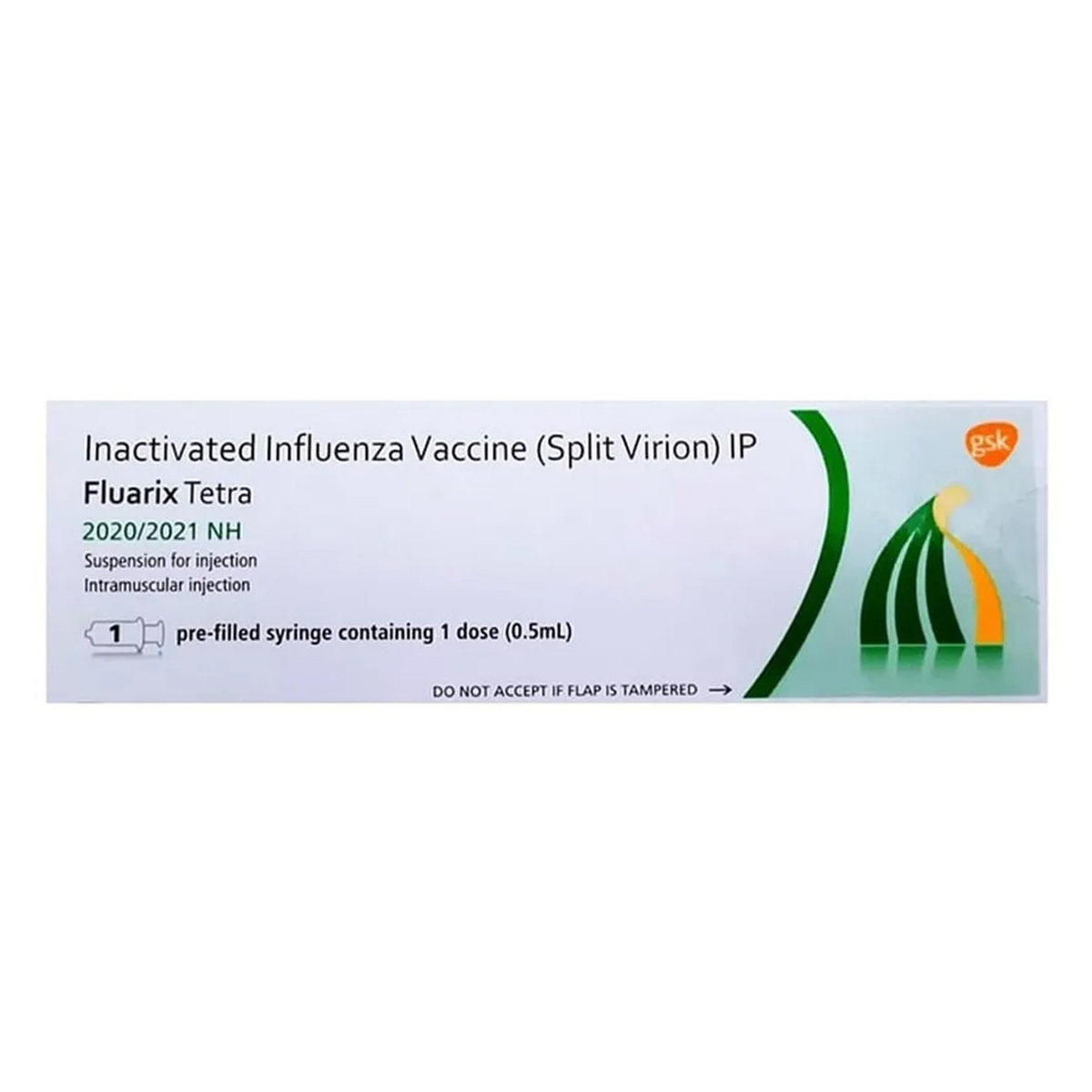Inactivated Influenza Vaccine
About Inactivated Influenza Vaccine
Inactivated Influenza Vaccine belongs to the group of medications called 'immunising agents' used to prevent influenza or flu. Influenza is a highly contagious viral infection that can quickly spread through an infected person's droplets or sneeze and cough. Influenza (flu) symptoms include a blocked or runny nose, sore throat, cough, and headache. In most cases, influenza is not severe. However, it can cause severe complications in some cases.
Inactivated Influenza Vaccine is an immunising agent or vaccine made from an inactivated vaccine (made from a dead virus). It helps to develop immunity by stimulating the immune system to produce antibodies. It is essential to take the vaccine doses per the doctor's advice for adequate protection against the disease.
Inactivated Influenza Vaccine is given as an injection into a muscle by a doctor or healthcare professional. The common side-effects of Inactivated Influenza Vaccine are headache, fever, weakness, pain and allergic reaction at the injection site. These side effects are usually mild and temporary. However, if these side effects persist or worsen, inform your doctor immediately.
It is not recommended to take if you are allergic to Inactivated Influenza Vaccine or any other ingredients present in it. Inactivated Influenza Vaccine should not be used in people with a severe allergic reaction to eggs or egg proteins (This is because some flu vaccines are made using eggs), have blood disorders or cancer of the immune system, have weak immune system due to diseases such as HIV or medicines such as immune suppressants, and have been taking aspirin or aspirin-containing drugs. It's safe to have the flu vaccine at any stage of pregnancy.
Uses of Inactivated Influenza Vaccine
Medicinal Benefits
Inactivated Influenza Vaccine is an immunizing agent or vaccine to prevent influenza in children and adults. It protects against virus strains present in the vaccine and other strains closely related to them. It stimulates the immune system to produce antibodies against the influenza virus.
Directions for Use
Storage
Side Effects of Inactivated Influenza Vaccine
- Headache
- Muscular pain (myalgia)
- Feeling unwell (malaise)
- Pain at the injection site
- Fever
- Shivering
- Dizziness
- Diarrhoea
- Reactions at the injection site: redness (erythema), swelling, hardness (induration)
Drug Warnings
Inactivated Influenza Vaccine is not recommended for use in people with a severe allergic reaction to eggs or egg proteins (This is because some flu vaccines are made using eggs) and a weak immune system. Inactivated Influenza Vaccine should be used with caution in children under 24 months of age who have severe asthma or wheezing or are in close contact with severely weakened immune system patients. You should not give aspirin or aspirin-containing medicines to children or adolescents for four weeks following Inactivated Influenza Vaccine. It may cause Reye syndrome (a severe condition that causes liver and brain damage). Should not use Inactivated Influenza Vaccine in people taking medicines that suppress the immune system as it will be less effective. If you're ill with a high temperature, it's best to wait until you're better before having the flu vaccine.
Drug Interactions
Drug-Drug Interactions: Inactivated Influenza Vaccine may interact with a pain killer (e.g. aspirin), antiviral medications (e.g. oseltamivir and zanamivir), immune suppressants (e.g. azathioprine, leflunomide, methotrexate, and deflazacort), and medicine used to treat blood-related cancer (e.g. mercaptopurine), and a vaccine used to prevent COVID-19 (e.g. sars-cov-2 mRNA).
Drug-Food Interactions: No interactions found.
Drug-Disease Interactions: Inactivated Influenza Vaccine should not be used in individuals with severe allergic reactions or infections, Guillain-Barre Syndrome, neurologic disorders, or a weakened immune system resulting from conditions such as HIV and AIDS.
Drug-Drug Interactions Checker List:
Safety Advice

Alcohol
cautionInactivated Influenza Vaccine may not interact with alcohol. However, as a precautionary measure, it is advisable not to take or limit alcohol.

Pregnancy
safe if prescribedIt's safe to have the flu vaccine at any stage of pregnancy. Your doctor will weigh the benefits and any potential risks before prescribing Inactivated Influenza Vaccine.

Breast Feeding
cautionInformation regarding the use of Inactivated Influenza Vaccine during breastfeeding is not available. Please consult your doctor.

Driving
safe if prescribedInactivated Influenza Vaccine may not affect your ability to drive. Do not drive or operate machinery if you experience any symptoms that affect your ability to concentrate and react.

Liver
safe if prescribedInactivated Influenza Vaccine is probably safe when used in patients with liver diseases. Your doctor will weigh the benefits and any potential risks before prescribing Inactivated Influenza Vaccine.

Kidney
safe if prescribedInactivated Influenza Vaccine is probably safe when used in patients with kidney diseases. Your doctor will weigh the benefits and any potential risks before prescribing Inactivated Influenza Vaccine.

Children
safe if prescribedCan give Inactivated Influenza Vaccine safely to children, dose to be adjusted and recommended by a child specialist only.
Habit Forming
Diet & Lifestyle Advise
- Consume a healthy diet rich in fruits, vegetables, whole grains, lean proteins, and low-fat dairy. Avoid processed and deep-fried foods.
- Foods rich in vitamin C such as tomatoes, strawberries, and citrus fruits helps to improve immunity.
- Avoid alcoholic beverages as they can make you dehydrated and may affect your sleep.
- Limit caffeinated drinks.
- Try to include heart-healthy omega 3 fatty acid containing food drinks in your daily diet. You can also use low-fat cooking oil like olive oil, soybean oil, canola oil, and coconut oil.
- Include turmeric or yellow mustard in your diet and increase the intake of fluids to stay hydrated.
Patients Concern
Disease/Condition Glossary
Influenza: Influenza or flu is produced by a virus that causes respiratory disease. It is highly infectious and quickly spreads through the droplets or sneezes and coughs of an infected person. Adults can start circulating the virus two days before the symptoms start showing up. They can spread it for up to 7 days from the day they become sick. This means you can stop spreading the influenza virus route before figuring out that you are ill. Influenza or flu is produced by a virus that causes respiratory disease. Symptoms of influenza include a blocked or runny nose, sore throat, cough, and headache. Other symptoms include high temperature, shivers, cold sweat, nausea, diarrhoea, and vomiting. In most cases, influenza is not severe, while, in some cases, flu can cause severe complications. This condition is primarily seen in older people, young children, and people with long-lasting diseases that can compromise their immune systems.
FAQs
Inactivated Influenza Vaccine is an immunising agent or vaccine made from an inactivated vaccine (made from a dead virus). It helps to develop immunity by stimulating the immune system to produce antibodies. It is essential to take the vaccine doses as per the doctor’s advice for adequate protection against the disease.
Taking aspirin, aspirin-containing drugs, or any other salicylates at least six weeks after taking Inactivated Influenza Vaccine is not recommended. It may cause Reye's syndrome, a severe condition resulting in liver and brain damage.
The common side-effects of Inactivated Influenza Vaccine are headache, slightly raised temperature, muscle aches, and weakness. These side effects are usually mild and temporary. However, if these side effects persist or worsen, inform your doctor immediately.
Inactivated Influenza Vaccine is not recommended for use in individuals with a weak immune system, such as cancer or HIV, as vaccines will be less effective in these people.
Both flu nasal spray and flu shot are effective vaccines. However, your doctor determines which vaccine is recommended for you based on age, health condition, and past medical history.







